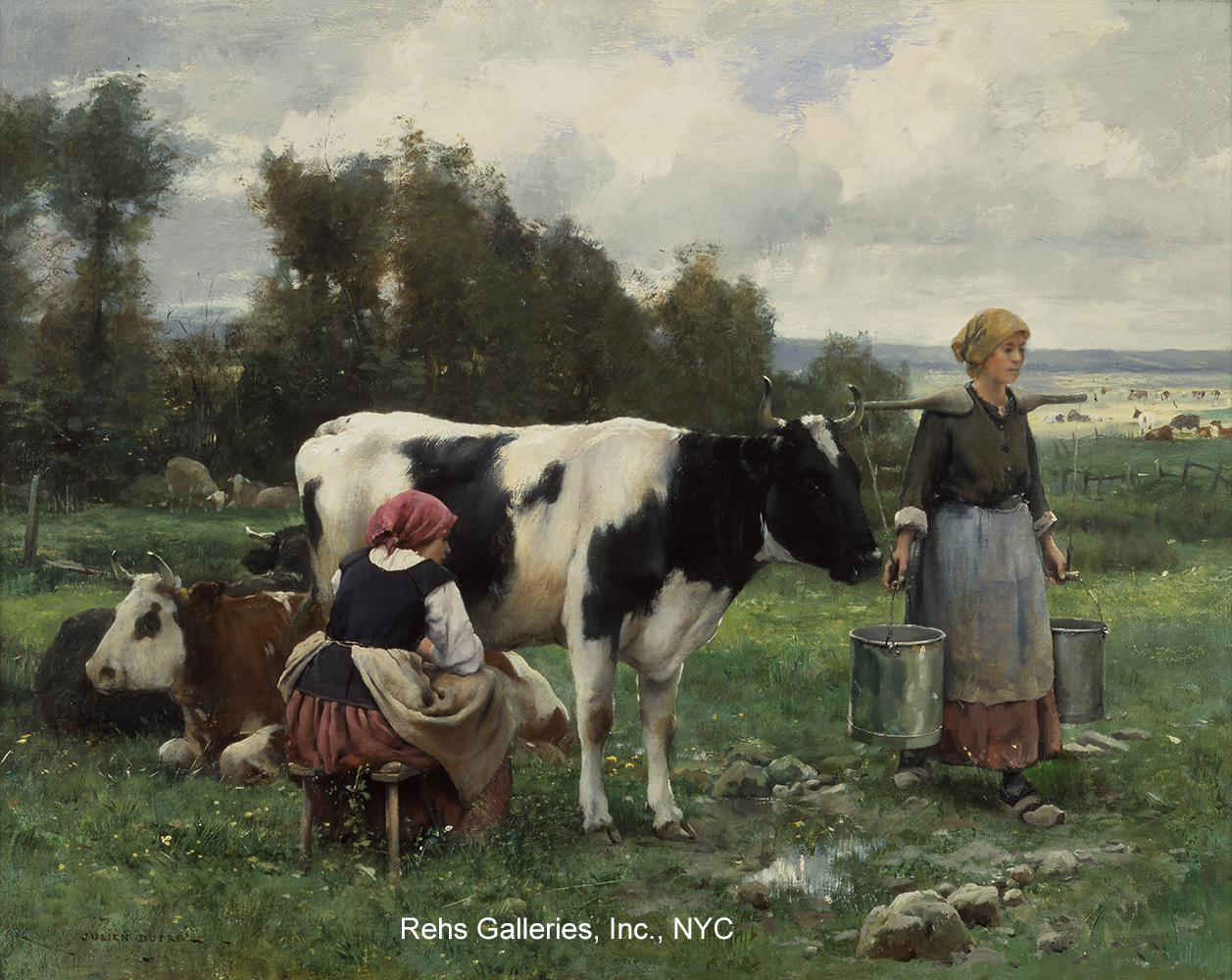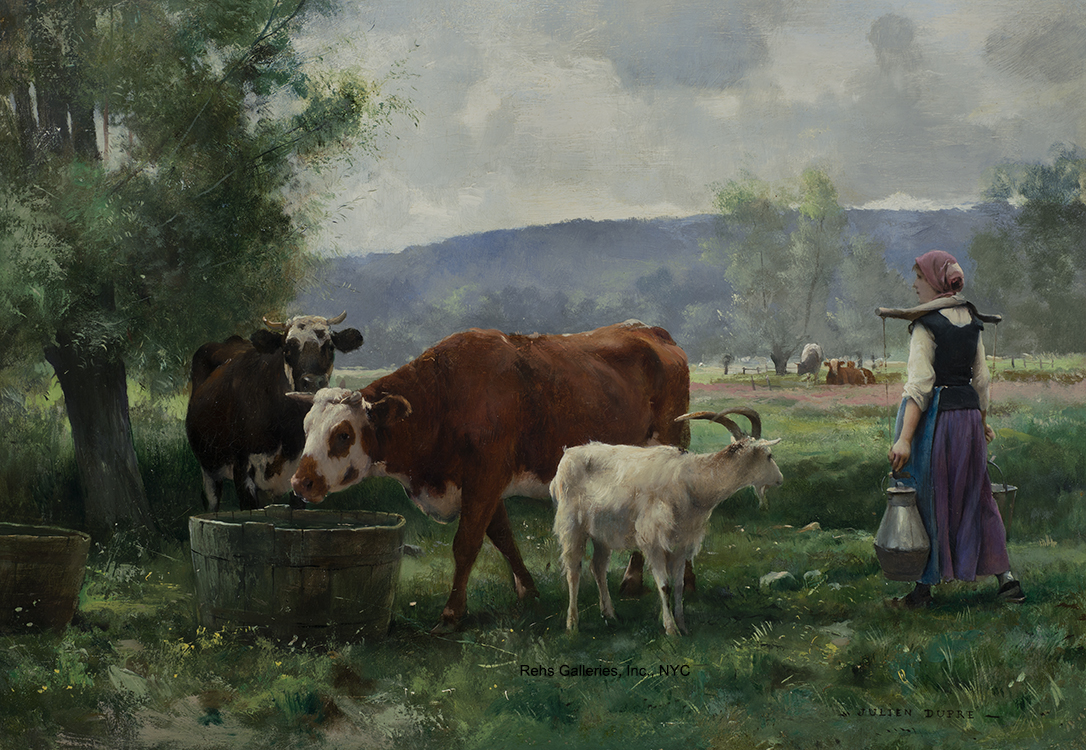
Châtenay-Malabry (FR - 92290), 11 January, 2021
EFITA newsletter / 967 - European Federation for Information Technology in Agriculture, Food and the Environment
Do not miss the Virus Jokes in English and French
> Coronavirus 4 Coronavirus 3 Coronavirus 2 Ant joke Coronavirus 1
> Virus et autres sujets Virus 6 Virus 5 Virus 4 Virus 3 Virus 2 Virus 1
> Les dernières histoire de l'oncle Paul (Jamet) (mostly in French)
> Les dernières histoires de Georges Larroque (mostly in French)
> Les dernières histoires de Michel Gil-Antoli (mostly in French)
> Les dernières histoires de Jean Pinon et Luc Becker (mostly in French)
> Et encore...
The informatique-agricole.org site now offers you the possibility of subscribing the RSS feeds of its two newsletters
See RSS feeds to implement to ensure that you continue to receive this newsletter
To unsubscribe this newsletter, please contact me directely: guy.waksman(a)laposte.net if this link Unsubscribe does not work.
Please note that I changed the presentation of the links that are embedded in the name of the web service.

To correspond with me (GW), please use this address: guy.waksman(a)laposte.net
To subscribe the efita newsletter (please ask your friends and colleagues to test this link)
Efita Newsletters subscription
Weekly newsletters about ICT in Agriculture in English and French
Both newsletters have around 14000 subscribers.
>>> Last weekly EFITA Newsletters in English (created in 1999) Efita Newsletters
>>> Last weekly AFIA Newsletters in French (created more than 20 years ago in 1997) Afia Newsletters
>>> Statistics for the last efita newsletter
>>> Last issue of the afia newsletter
>>> Last available satistics for the afia newsletter
An Optimistic Outlook on 2021, by Tony Morley
2020 has felt particularly punishing, at least in part because the decade that preceded it was astonishingly hopeful and productive according to almost every metric of human progress. Extreme poverty was dramatically reduced, from 18 percent of the global population to just 8.6 percent. More than 158,000 people climbed out of extreme poverty every day for 10 years. The child mortality rate was reduced by a third, saving the lives of more than 2.1 million children. Average global life expectancy grew from 69.5 years to 72.6 years.1 The death rate from indoor air pollution decreased by 19 percent, while deaths from climate-related natural disasters decreased by a third, to just 0.35 per 100,000 persons. The proportion of the population with access to electricity, meanwhile, jumped by over 10 percent, from 79.9 percent in 2010 to 90 percent in 2020.
.../...
Earlier this month, I asked Steven Pinker for his thoughts on the metrics of progress leading into 2021. “Many other measures will be worse,” he replied, “but people who expect progress to be monotonic, with every year better than the previous one, may have a mystical idea of progress as a natural force. Progress consists of solving problems, and nothing guarantees that new problems will never arise, nor that they will be solved instantaneously. Infectious disease is the rule among living things, not the exception. The fact that an effective vaccine is ready to be implemented less than a year after the disease exploded is astonishing—even if many measures of well-being will have dipped this year.”
Progress hasn’t contracted nearly as sharply as we might assume, and that is cause for celebration. It’s difficult and counterintuitive to celebrate a year that went as poorly as this one, but things could have been much worse. We ought to celebrate the fact that the outlook is better than it appears, and it’s our responsibility to meet the challenges of 2021 with rational, fact-based optimism. As we close out this terrible year, let us remember that the keystone to a safe and prosperous 2021 lies in our collective capacity to work together as a globalized civilization. As Johan Norberg observes in the opening pages of his 2020 book, Open: The Story of Human Progress, “Homo sapiens is a cooperative species. Compared to many other animals, we are not particularly strong or fast, we don’t have armour, we can’t fly and are not very good at swimming. But we have something else that gives us an overwhelming advantage: we have each other.”
See quillette.com
Nothing is more responsible for the good old days than a bad memory: Stonepickers, Mid-day, 1882, by George Clausen (UK, 1852 - 1944)
Dozens of scientific breakthroughs this year upended our understanding of human history, the search for alien life, and the coronavirus pandemic
Astronomers, archaeologists, geneticists, and many other scientists made mind-boggling breakthroughs in 2020.
Some highlights include work that uncovered stashes of mummies, launched the first-ever crewed commercial spaceflight, and produced COVID-19 vaccines in record time.
These are 34 of the biggest scientific accomplishments of the year.
Visit Business Insider's homepage for more stories.
See businessinsider.com
How did we the future yesterday??
See the incredible collection developed by Alain Fraval
5 trends that shaped agrifoodtech in 2020, AFN, by Jack Ellis
1. Food e-commerce just keeps getting bigger
2. Automation, robotics, and ‘contactless’ tech thrown into the limelight
3. Bring on the biologics
4. Carbon comes of age?
5. Alt-protein goes mainstream, with Asia Pacific leading the way
See agfundernews.com
Start-up Profile – FarmWise – Machine Learning and Robotics Powers Agricultural Weeding Solution
The FarmWise agricultural weeding-as-a-service solution, which leverages computer vision, machine learning and robotics technologies, can be optimized for different crops, soil types, and growth stages.
See roboticsbusinessreview.com
Nothing is more responsible for the good old days than a bad memory: Milkmaids in the Field by Julien Dupré (1851 - 1910)
Efita 2021 Conference
25 -26 May 2021 - Digital Agriculture Web Conference
The European Federation for Information Technology in Agriculture, Food
and the Environment (EFITA) would like to invite you at the first EFITA
International online Conference in 2021. As a way to keep the momentum
and engagement of our society, while maintaining the plans for the 2022
physical EFITA conference, this conference and its format are planned
as a response to the unpredictable situation created by the COVID-19.
This event is an opportunity to bring together engineers, scientists,
technicians, aca-demics and industry people in a new way to exchange
knowledge, ideas, to present innovations and to discuss the state-of-the-art
and future use of ICT in the agri-food sector and bio-resources production
sectors.
See efita2021.com
Contact: Dionysis BOCHTIS
E-mail: d.bochtis(a)certh.gr
Nothing is more responsible for the good old days than a bad
memory: La jeune laitière avec son troupeau par Julien Dupré (1851
- 1910)
The 20 highest-funded agrifoodtech startups of 2020 AgFunder research, AFN, by Lauren Stine & Jack Ellis
1. MissFresh (China)
2. Impossible Foods (US)
3. Zomato (India)
4. Indigo (US)
5. DoorDash (US)
6. Samsara Networks (US)
7. Toast (US)
8. Dingdong Maicai (China)
9. Apeel Sciences (US)
10. Berkshire Grey (US)
11. Farmers Business Network (US)
12. Instacart (US)
13. Ÿnsect (France)
14. Tongcheng Life (China)
15. Memphis Meats (US)
16. Swiggy (India)
17. Market Kurly (South Korea)
18. RWDC Industries (Singapore)
19. GreenLight Biosciences (US)
20. Kopi Kenangan (Indonesia)
See agfundernews.com
AFN’s top 20 news stories of 2020, AFN, by Jack Ellis
See agfundernews.com
AFN’s top 20 guest articles in 2020, AFN, by Jack Ellis
See agfundernews.com
Nothing is more responsible for the good old days than
a bad memory: Paysanne par Camille Pissarro
Culterra Capital
Culterra Capital provides strategic and transaction advisory services to Food, Ag and Tech innovators and corporates. We work with startups, investors, C-Suite and corporate development teams to help develop and implement strategic and financial priorities which capitalize on emerging tech innovations.
Our team is known for our substantive industry insights which are shaped by the appreciation of the exceptional realities and complexity of the food & ag industry. Unlike generalist advisors, we are a unique “inside advisor” to Boards and management teams helping to evaluate a full range of strategic options as a long-term investment partner, not just a transaction partner.
>> Farmtech Landscape 2020 by CULTERRA Capital
| If
the images are not clear, high resolution images are available
on the CULTERRA Web site See culterracapital.com |
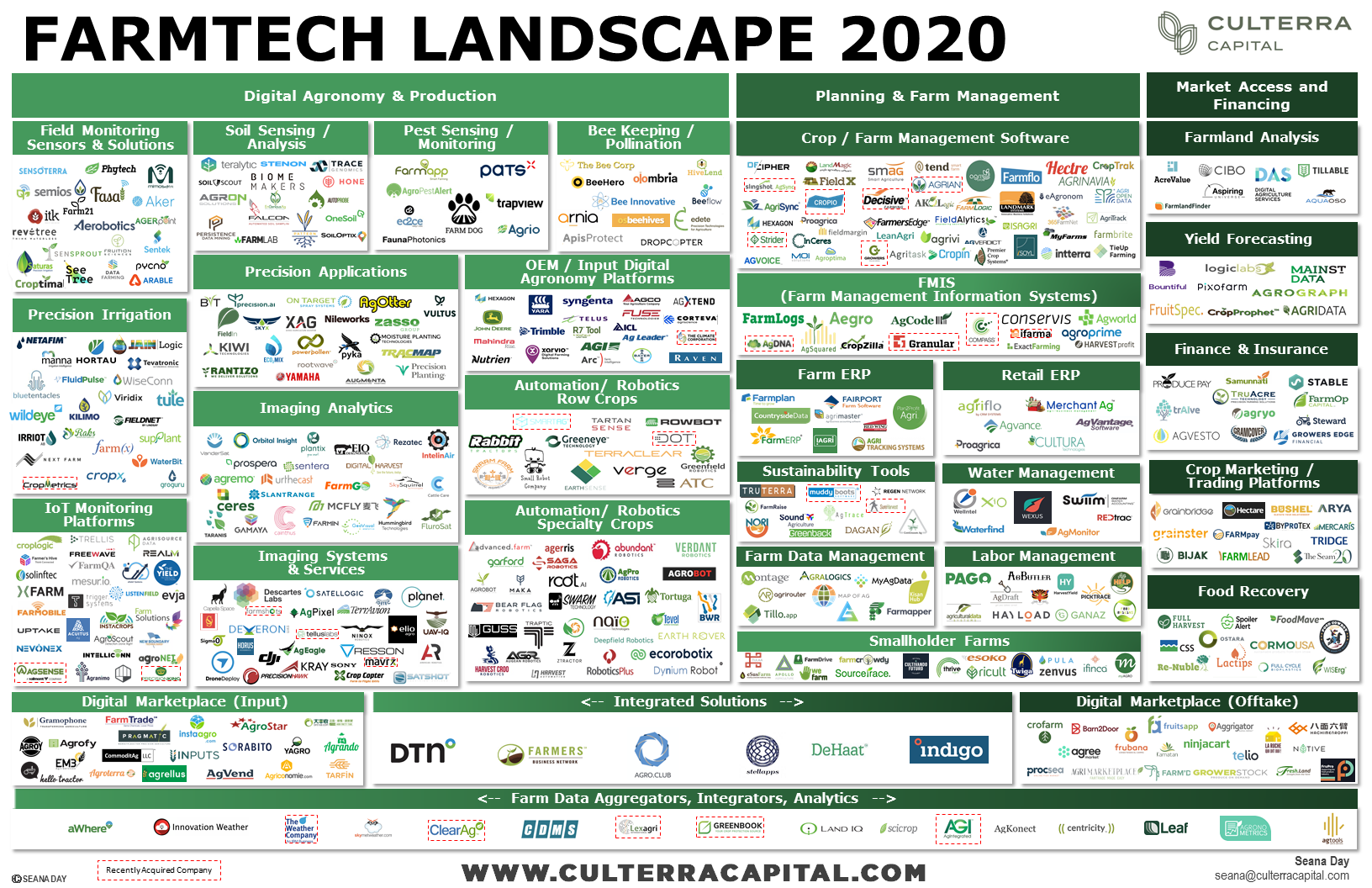 |
>> Food supply chain tech landscape 2021 by CULTERRA Capital
| See culterracapital.com | 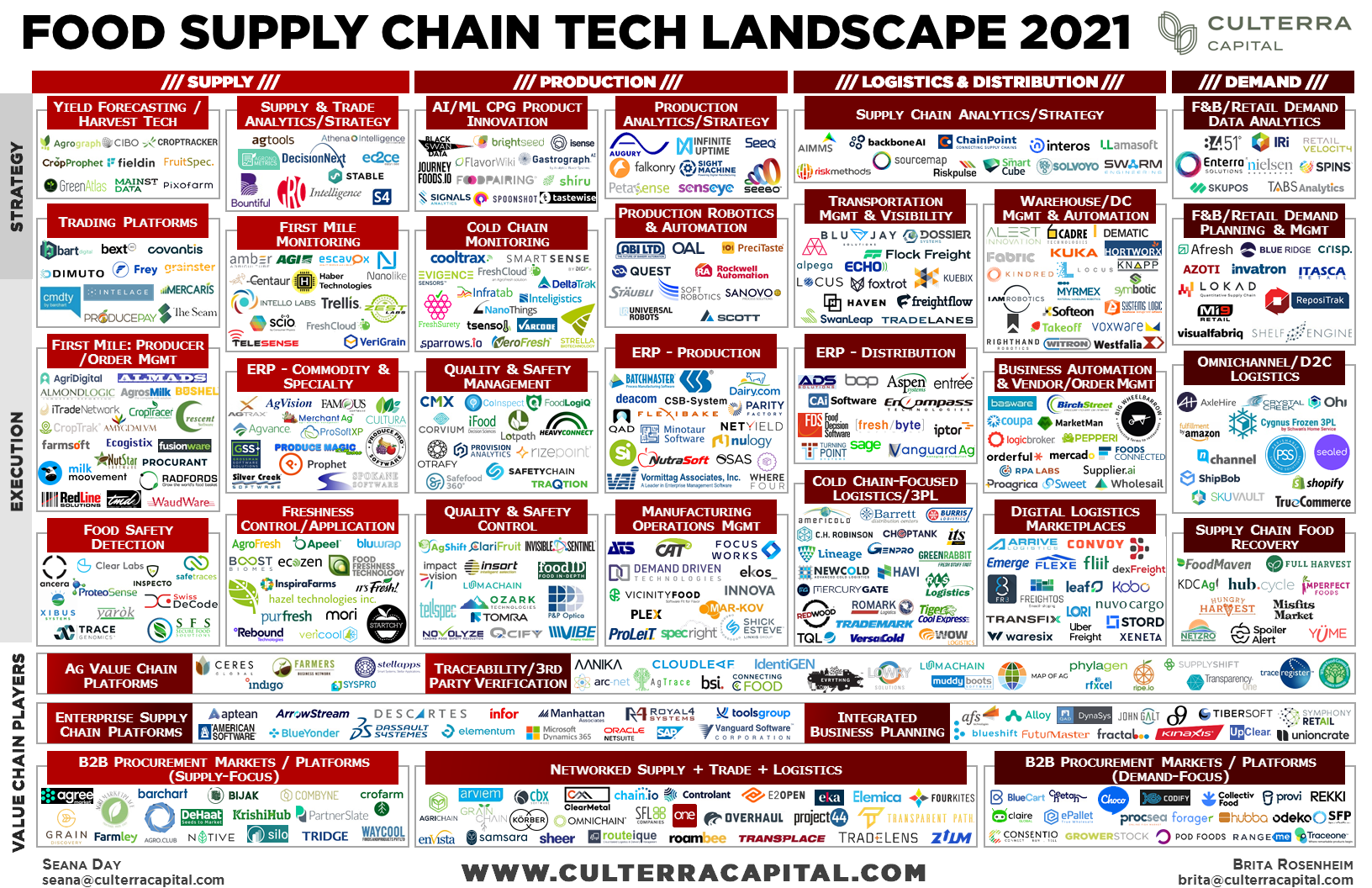 |
>> Foodtech & Media Landscape 2020 by CULTERRA Capital
| See culterracapital.com |  |
Nothing is more responsible for the good old days than a bad memory (?????): Femme au champs par Camille Pissarro
Ag data player CropIn banks $20m from Temasek-linked impact fund, others, by Jack Ellis
.../...
The Bengaluru-based startup largely works on a B2B basis, catering to agribusinesses that serve individual growers and farmers and providing its customized solutions to these end users via reseller partnerships in close to 20 countries. This has allowed it to “effectively digitialize over 13 million acres of farmland within a short span of time,” co-founder and CEO Krishna Kumar told AFN.
CropIn has also partnered with governments and development finance institutions in 52 countries to assist with their agricultural projects.
…/…
See agfundernews.com
Nothing is more responsible for the good old days than a bad memory: La Récolte, Pontoise, Camille Pissarro (1830–1903, FR), The Metropolitan Museum of Art
How digital tech helps farmers make money with carbon credits
In order to understand how digital technology will help farmers earn money from sequestering carbon in the soil, we take a look at two new projects in North America.
See futurefarming.com
Autonomous tractors: Monarch Tractor launches fully electric autonomous tractor
The electric Monarch Tractor can perform pre-programmed tasks without a driver.
See futurefarming.com
Agtech in practice: Practical answers on precision tech – Part 2
Variable-rate has been a cornerstone of Hiebert’s family grain and asparagus operation.
See futurefarming.com
Drones & robots: XAG unveils new drones and field robots for Chinese market
New releases include three agricultural drones and two editions of the R150 Unmanned Ground Vehicle.
See futurefarming.com
Nothing is more responsible for the good old days than a bad memory: Farm Cart On A Country Road by Anton Mauve (1838 - 1888)
| 8 |  |
Crop science: New insights about photosynthesis could improve crop yields
A light signal emitted during photosynthesis can be used to quickly screen crops and improve yields.
See futurefarming.com
Field robots: Robotriks autonomous platform is low-cost farm assistant
Robotriks field robot built using as many mass-produced components as possible to minimise costs.
See futurefarming.com
Field robot catalogue: World’s first robot catalogue with 35 propositions
In our robot catalogue you will find 35 field and harvest robots that are available in 2021.
See futurefarming.com
The Decade Ahead: Societal Trends Will Leave Their Mark On Agriculture
.../...
There is a growing realization that data from all aspects of our lives—personal to professional—has immense value. As consumers become more woke regarding the food they purchase, data into how their food is produced is becoming almost as tangible as the product itself.
.../...
See thedailyscoop.com
| |
How Weed Control Choices Have a Domino Effect on Communities, by Sonja Begemann
When one person jumps into a pool, the ripples affect the entire community in the pool, not just that one person. In a similar way, the choices you make in regard to weed control impact more than just your fields, they affect your neighbors and ultimately entire community.
For example, farmers who ignore weed resistance and continually use the same mode of action year in and year out build a weed seed bank that trashes not only their own fields but travels to neighboring fields. Another example: Recent farmer herbicide decisions affect not only their own operations but others as well.
Researchers at Kansas State University examined how the use of dicamba and how its potential for success or for off-target movement influences neighbor decisions. In this scenario there are both weed resistance/weed management and social repercussions.
.../...
See thedailyscoop.com
Global food prices at six-year high are set to keep on climbing, Bloomberg, by Agnieszka de Sousa & Megan Durisin
…/…
The FAO’s food price index has risen for the past seven months, with annual prices capping the highest average in three years. Still, costs remain well below peaks in 2008 and 2011, when soaring prices caused political and economic instability around the world and grain-export bans tightened supply.
“Commodity price inflation is very real, but we’re still nothing like a decade ago,” said Tim Benton, research director in emerging risks at Chatham House in London. “I am reasonably confident that it’s not going to lead to big things as per a decade ago. But still, Covid has the potential to upset things in terms of flows of goods, in terms of access to labor.”.
| See bloomberg.com | 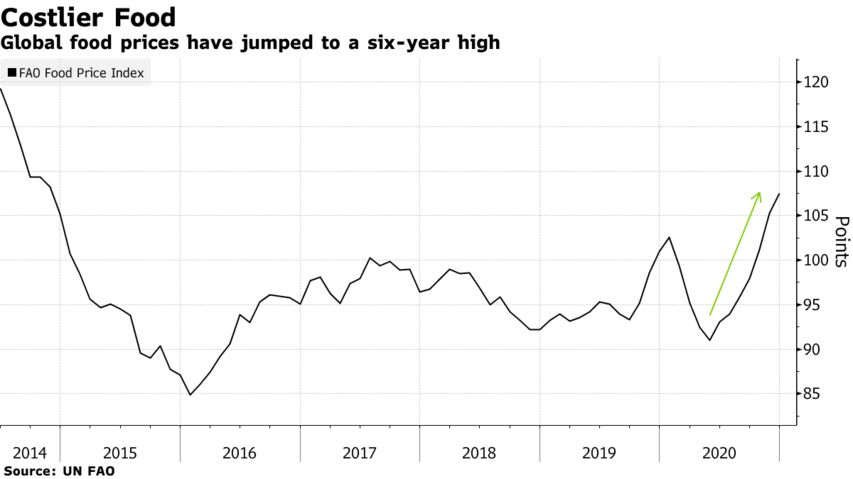 |
I teach a course on happiness at Yale: this is how to make the most of your resolutions, by Dr Laurie Santos
See theguardian.com
Identical twins are not so identical, study suggests
Research finds they differ by an average of 5.2 early mutations, adding new perspective to nature-versus-nurture debates.
See theguardian.com
No kidding: You're going to love this cheesy collection of puns
What do you call a fish without eyes? Fsh
A ham sandwich walks into a bar and orders a beer, bartender says “sorry, we don’t serve food here.”
What do you call an alligator detective? An investi-gator.
Why did the scarecrow win an award? Because he was outstanding in his field.
There are two muffins baking in the oven. One muffin says to the other, “Phew, is it getting hot in here or is it just me?” The other muffin says, “AAAAHHH!! A TALKING MUFFIN!”
What lights up a soccer stadium? A soccer match.
Why shouldn’t you write with a broken pencil? Because it’s pointless.
What’s the difference between the bird flu and the swine flu? One requires tweetment and the other an oinkment.
The distribution of this efita newsletter is sponsored by vitisphere.com
Please, contribute to the content of your efita newsletter, and advertise your events, new publications, new products and new project in this newsletter. Without your support, it will not survive!
Contact: Guy WAKSMAN
E-mail: guy.waksman(a)laposte.net
To read this newsletter on our web site
See Afia
The archives of this newsletter
See Afia
About the EFITA mailing list
You can use the efita moderated list (> 15000 subscribers) to announce any event / product / web site / joke (!) related to IT in agriculture, environment, food industry and rural areas.
If you want to subscribe a friend, please fill in his form.
If you do not wish to receive our messages, please fill in the following form...



